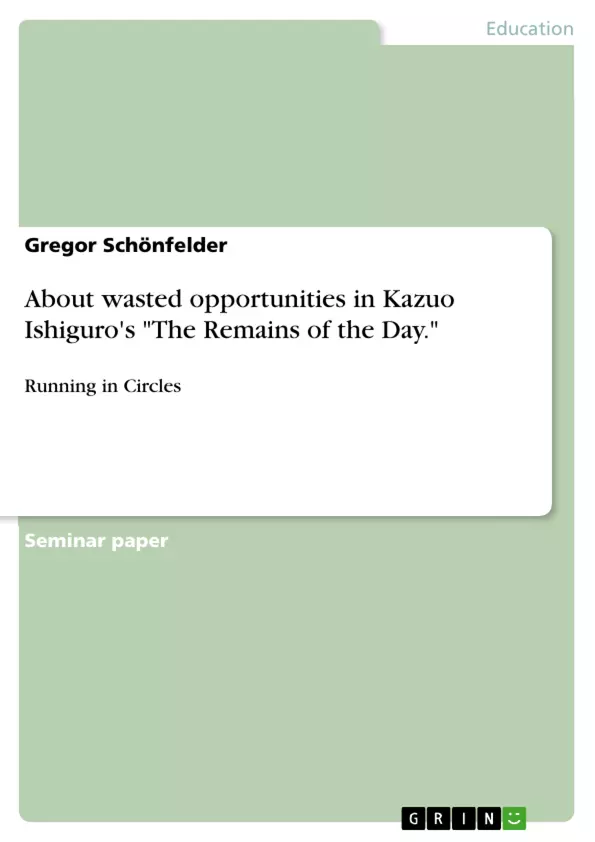The narration is primarily about wasted opportunities, about a man who is looking back upon his life and wishes he had acted differently. Through his ‘expedition’,Mr Stevens is granted the opportunity to rethink his life, identify the mistakes he made and avoid them in the future. The question is whether he uses this opportunity wisely or if he wastes it. Already in the prologue Mr Stevens admits to have “a reluctance to change too many of the old ways”, and this will be proven to be all-too true (Ishiguro 7). His behaviour and attitude after the journey which could have been a turning point in his life are by and large not altered after his journey.Mr Stevens is not able to change himself in the important areas, namely his restraint, his extreme professionalism, and the attitude towards his father, although he makes some superficial progress regarding Lord Darlington.
Inhaltsverzeichnis (Table of Contents)
- Introduction
- Stevens' restraint
- Stevens' exaggerated professionalism
- Stevens' view of his father
- Stevens' view of Lord Darlington
- Conclusion
- List of works cited
Zielsetzung und Themenschwerpunkte (Objectives and Key Themes)
This essay analyzes the character of Stevens, the butler in Kazuo Ishiguro's novel "The Remains of the Day," examining his personality and the reasons for his restrained and professional demeanor. The essay explores how his past experiences and his relationships with other characters shape his present actions and choices.
- Stevens' inability to express his feelings
- Stevens' devotion to his profession
- Stevens' relationship with Mrs. Kenton
- Stevens' views on his father and Lord Darlington
- The theme of missed opportunities and regrets
Zusammenfassung der Kapitel (Chapter Summaries)
Introduction: This chapter introduces the protagonist, Mr. Stevens, and his journey through the English countryside. It highlights his reluctance to change and his past mistakes, which he now contemplates. The essay argues that Stevens' journey provides an opportunity for him to reflect on his life, but it is unclear if he fully utilizes it.
Stevens' restraint: This chapter focuses on Stevens' profound restraint, which is presented as a virtue by him. It examines how his inability to express emotions hinders his ability to form deeper relationships. The essay uses the example of Stevens' reaction to Mrs. Kenton's aunt's death to illustrate his conflicting emotions and his inability to offer support openly.
Stevens' exaggerated professionalism: This chapter explores Stevens' dedication to his profession as a butler. The essay argues that his devotion to service prevents him from acknowledging and acting on his personal feelings, particularly those related to Mrs. Kenton. It examines instances where Stevens claims professional motivations while the reader suspects deeper emotions at play.
Frequently Asked Questions
What is the central theme of "The Remains of the Day"?
The novel primarily explores the theme of wasted opportunities and regrets, as the protagonist reflects on his life and choices during a journey.
Who is the protagonist of the novel?
The protagonist is Mr. Stevens, a dedicated and highly professional English butler who served at Darlington Hall.
How does Stevens' professionalism affect his personal life?
His exaggerated sense of professionalism and restraint prevents him from expressing his true feelings, especially towards Mrs. Kenton, leading to missed emotional connections.
What is the significance of Stevens' journey?
The journey serves as a catalyst for self-reflection, allowing Stevens to reconsider his past mistakes and his loyalty to Lord Darlington.
Does Stevens change by the end of the story?
According to the analysis, Stevens struggles to change in fundamental areas like his emotional restraint, despite gaining some superficial insights during his trip.
- Quote paper
- Gregor Schönfelder (Author), 2009, About wasted opportunities in Kazuo Ishiguro's "The Remains of the Day.", Munich, GRIN Verlag, https://www.grin.com/document/203786



